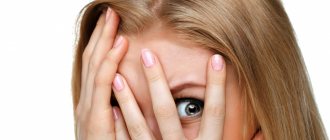Home>Articles>Why does a hangover cause anxiety?
quick menu (hide)
- Hangover symptoms
- Reasons for formation
- Hangover anxiety
- Mental components of anxiety
- Memory loss due to hangover
- Relieving hangover anxiety
A hangover is a condition after severe alcohol poisoning. It is characterized by a lot of unpleasant symptoms. They can only have physiological properties. Most people who have drunk more than once can report that after sobering up they experienced severe anxiety and fear.
Unreasonable anxiety, anxiety from a hangover, or even unreasonable fear - all these troubles arise simultaneously with the occurrence of severe headaches, palpitations and nausea. And therefore they are endured with particular severity.
Anxiety and fear from a hangover stimulate the release of adrenaline. A person’s heart rate increases, blood pressure rises, and headaches can become unbearable. In place of anxiety, a person develops a panic state.
If this condition is not dealt with, then deviations can increase and reach a critical point, which will pose a threat not only to human health, but also to human life.
The essence of the problem
Worry for no reason, fear and anxiety from a hangover often appear simultaneously with other symptoms, such as migraines, rapid heartbeat, and nausea. But it is psychological changes that are perceived by patients as extremely difficult. If you can get rid of a headache by taking Analgin, then not a single pill can eliminate the discomfort associated with panic.
When a panic attack occurs, your health worsens even more. The adrenaline rush makes the heart beat faster. There is a sharp increase in pressure, headaches intensify . That is, against the background of fear, the patient’s physical condition also worsens.
If you don’t figure out how to relieve anxiety from a hangover in time, the condition can reach an extreme level. In this state, a person is capable of desperate acts, including suicide. Therefore, only careful attention to the health of the addict and timely assistance will help avoid dangerous consequences.
Literature:
- Clinical and psychological characteristics of alcohol dependence combined with endogenous depression: a manual for doctors / [T. G. Rybakova, O. F. Eryshev] ; Ministry of Health and Social Development of the Russian Federation, St. Petersburg Scientific Research. Psychoneurological Institute named after. V. M. Bekhtereva. – St. Petersburg: [Publishing house of St. Petersburg scientific research. Psychoneurological Institute named after. V. M. Bekhtereva], 2008. – 26 p.
- Depression and alcoholism, clinical and social relationships: educational and methodological manual / Shcherbak E. A., Kutashov V. A., Sivolap Yu. P.; Ministry of Health of the Russian Federation, Voronezh State Medical University named after N. N. Bauman. – Moscow: RITM, 2021. – 173 p.
- Comorbid disorders in drug treatment practice / G. L. Gurevich. – Moscow: Medpraktika-M, 2007. – 120 p.
How does panic manifest itself?
The severity of fear during a hangover directly depends on the following factors:
- Exactly how much alcohol was consumed.
- What strength of drink was used?
- What is the quality of the drink, that is, the presence of impurities, especially fusel oils.
- What is the general health of the patient at the time of drinking alcohol, the presence of chronic diseases and mental health.
It is noteworthy that a woman’s body differently . Ethanol breaks down more slowly, so the severity of the toxic effects is less. For this reason, they experience feelings of anxiety and stress less often.
If you can still cope with fear on your own , then panic attacks have a more severe course with their own complications. They can be recognized by the following characteristics:
- Increased heart rate.
- Frequent breathing.
- Severe fatigue.
- Strong desire to sleep.
- Tremor of arms and legs.
- Frequent urge to go to the toilet.
- A feeling of growing horror.
- Visions of both auditory and visual nature.
Symptoms do not occur in full. As a rule, 2-3 symptoms are present. But the greater the volume drunk and the stronger the drinks, the more severe the condition. In patients who try to cope with binge drinking on their own without medical help, panic attacks are especially difficult . In the later stages of alcoholism, getting rid of panic attacks rarely gives lasting results. Such patients often commit suicide. Therefore, it is important to consult a doctor at the first sign of panic due to a hangover.
How long does hangover depression last?
Depression during a hangover gradually goes away on its own, but how long it will last depends on many factors. Once alcohol is completely eliminated from the body, the negative consequences will disappear. This usually takes a few days, but sometimes the bad mood persists for weeks or months.
How depression manifests itself in people with alcohol addiction:
- Bad mood
- insomnia or drowsiness
- inhibition of reactions
- depression, apathy, irritability
- the desire to do anything disappears
- self hatred
- decrease in concentration
- loss of appetite
- suicidal thoughts may occur.
Why does panic occur?
After alcohol enters the body, the main role in neutralizing it is assigned to the liver. This organ produces enzymes that break down ethanol into safe compounds . In the event that alcohol is consumed for a long time and in large quantities, the liver can no longer cope with its task. Enzyme production stops. Therefore, decay products remain unchanged in the body, causing poisoning.
If there is a lack of pyruvate, glucose production stops. This substance is extremely important for normal brain function. If there is a lack of it, the brain does not receive enough nutrients. In some cases, this can cause shock and death. But this happens extremely rarely. More often, people who have had too much alcohol experience the following symptoms:
- Extreme fatigue.
- Marked weakness.
- Decreased concentration.
- Expressed fear.
Such patients are characterized by the appearance of obsessive thoughts about death. This instills panic in a person.
There are also changes in the functioning of the nervous system. If small doses of alcohol cause an increase in mood, euphoria and joy, then after a while the state of health can change . Aggression, inadequacy and overexcitement appear. Even later, anxiety and fear appear with a hangover. Patients do not understand why the sensation arose, which frightens them even more.
Additional components of the drink can increase the likelihood of a panic attack. This is especially true for sweet cocktails. In addition, zinc is often added to drinks to create a specific taste. It is also worth noting that dark drinks have a more pronounced effect on the state of the psyche than light ones. After consuming them, the hangover is more severe and fear is more pronounced.
Each drink has characteristics This pronounced fear of a hangover is observed after prolonged consumption of whiskey and tequila. This is explained by the fact that during their production fusel oils, which are responsible for the taste and aroma of the drink, are not removed. They are the ones who cause changes in the psyche of an alcoholic.
In addition, the cause of fear may be cell starvation. With a lack of oxygen, the central nervous system suffers. The body loses fluid because alcoholics do not eat nutritious food due to the intake of empty calories from alcohol. The body, trying to cope with the problem on its own, tries to retain fluid, accumulating it in the tissues. This affects the brain. Poor circulation and lack of oxygen cause the development of discirculatory encephalopathy. This disease is always accompanied by the appearance of unreasonable anxiety.
With DEP, a feeling of fatigue appears; such patients are often in a state of apathy. They suffer from a feeling of shame for their behavior, provided they remember it. In other words, the appearance of anxiety is associated with severe intoxication of the body, as a result of which the brain, liver and heart suffer.
Diagnosis and treatment of alcoholic depression
Only a specialist can make a diagnosis of post-alcohol psychological disorders based on differentiation with other types of depressive syndromes that have similar clinical signs. To confirm the diagnosis, the doctor analyzes the patient’s complaints and conducts a physical examination. Only after clarifying the nature of the pathological process will a specialist be able to decide how to cope with alcoholic depression in a specific clinical case and select an appropriate treatment plan.
The main difficulty when choosing a therapeutic regimen is the inadequate attitude of most patients to their condition. They do not want to realize that it was not depression that caused the binge, but, on the contrary, excessive consumption of strong drinks provoked the development of depressive syndrome. Relatives of drinkers should know: if a person who drinks frequently and heavily has alcoholic depression, treatment should be comprehensive and carried out in a drug treatment clinic. Most often, the following methods of therapy are used to eliminate post-alcohol depression:
- Medication. Patients are prescribed pharmacological drugs belonging to the drug groups of antidepressants, tranquilizers and hypnotics. At the same time, detoxification therapy is carried out to relieve signs of withdrawal syndrome.
- Psychotherapy sessions. They are necessary to consolidate the effect achieved by using medications. Thanks to group or individual psychotherapeutic sessions, it is possible to finally solve the problem of alcoholism and teach a person to enjoy life again.
- Physiotherapy. Physiotherapeutic procedures show high effectiveness in the treatment of post-alcohol depressive syndrome. The most effective, in the mutual opinion of narcologists, are artificial sleep, electrical stimulation, and acupuncture. These procedures harmoniously complement treatment with pharmaceutical drugs and accelerate the patient’s recovery from a depressive state caused by prolonged alcohol consumption.
The best option for ridding a person of a pathological condition is inpatient treatment under the constant supervision of doctors and medical personnel. But the patient himself must decide to begin treatment and be confident in its success. Only then will he be able to get rid of alcohol addiction.
The mental side of the appearance of fear
The appearance of anxiety can be explained not only by symptoms of poisoning of the body. Psychological components are also important. The severity of panic increases in those patients who are trying to find a way out of life’s problems in alcohol.
Dissatisfaction with family, problems at work, failures in love. All this is filled with another dose of alcohol. Severe intoxication causes panic and shame from the realization that a person is not able to control himself. This makes the situation even worse. Such patients suffer not only from panic attacks, but also from depression.
But the feeling of guilt arises only if the patient’s center responsible for memory has not yet been damaged. But more often, addicts experience short-term memory lapses. This can also cause fear . Such people do not remember where they drank, with whom, what they did and how they behaved. It scares them. For some, their memory is restored after another dose of alcohol, others learn the truth from their drinking buddies.
Memory loss explains the way some alcoholics behave. Immediately after drinking, they lose adequacy and may show aggression, but after sobering up they do not remember anything that happened. After loved ones tell them about how they behaved, stress and panic appear, followed by shame, since the situation cannot be corrected.
Health implications
Despite the fact that depression goes away over time, people at risk may develop the following negative consequences:
- Auto-aggression. A condition in which a person tries to harm himself: scratch, cut, burn himself.
- Suicide. Suicide attempts often occur due to alcoholic depression.
It is important to understand that such manifestations are not typical for healthy people, but for those who have a history of some kind of mental disorder. But in other cases, primary depression can serve as an impetus for the progression of the disease and the development of alcohol dependence.
What to do if you are afraid?
At the first sign of a mood change, it's important to understand how to relieve hangover anxiety. First of all, it is important to restore contact with loved ones. A banal conversation often helps as well as a psychologist. If the method turns out to be ineffective , move on to other methods.
If the alcoholic is alone, you can leave the house, take a walk in the fresh air, or do something. It is important not to be alone with your own thoughts and to be distracted from them. You need to remember something pleasant that brings joy and a smile. But you can’t blame yourself for what you’ve done. This will only make the situation worse.
If the serious condition persists , you can take any sedative, eat your favorite dish, watch your favorite movie or listen to music.
If simple methods do not help and the condition does not improve, you need to start treatment. Considering that the cause is poisoning, it means you need to start with improving your physical condition. To do this, it is important to restore the salt balance and remove toxins:
- You need to drink as much liquid as possible, for example, herbal decoctions, tea, dairy products.
- You should not treat a hangover with another dose of alcohol. This can make the situation worse.
- It is worth increasing the amount of vitamin C in the diet. It normalizes metabolic processes, removes toxins and accelerates cell regeneration.
- A contrast shower will have an excellent effect. But if there is a high risk of heart and vascular disease, this method is not used.
- You can't refuse food. The diet should include light soups, porridges, and broths.
In the future, in order to prevent anxiety, it is important to drink light drinks, observe moderation and use only high-quality alcohol. Hangovers can be relieved with folk recipes. The faster the decay products are removed, the less pronounced the panic will be.
Briefly about the subject of conversation
Before starting the discussion, it is necessary to distinguish between the concepts of neurological and mental dysfunctions. The line between them is very thin, since these types of pathologies are closely interrelated, but still, within the framework of this article, we will only talk about violations directly related to the following processes:
- perception
- obtaining information about the surrounding world based on the processing by the brain of external data received from the senses; - thinking
is a cognitive activity characterized by generalization of sensory data and indirect reflection of reality through a second signaling system (speech); - moral and mental state
is the general direction and nature of all mental processes and emotional experiences of a person.
What mental disorders can occur after heavy drinking?
Scientific narcology distinguishes five main mental disorders that occur after interrupting an alcoholic binge:
- Depression
: loss of the ability to experience pleasure, causing persistent depressed mood, apathy and lack of desire to live. - Delusional psychosis
: the appearance of illogical and/or worthless ideas, the development of persecution mania or unreasonable, indomitable jealousy. - Hallucinosis
: an uncontrollable influx of visual and/or auditory hallucinations. - Delirium (delirium tremens)
: a peculiar combination of hallucinosis and delusional psychosis, taking individual forms depending on the personal qualities of the patient. - Alcoholic dementia: intellectual dementia, expressed in the loss of the ability to adequately perceive reality and make logically related conclusions.
Contact a psychologist
At an appointment with a specialist, you can find out why you are in a bad mood after drinking alcohol, how to get rid of shame and what to do about it. It is possible that a psychotherapist will help you discover other problems that are driving you to drink alcohol. It is important that your behavior in a drunken stupor does not become the norm for you, so you need to start acting in advance.
If you are suffering from a hangover, then before visiting a psychologist you need to come to your senses, try to calm down, drink sedatives: mint tea, valerian.
Available Methods
The following will help you improve your physical condition after intoxication:
- cold and hot shower;
- Drinking plenty of fluids (mineral water, sour fruit drinks, juices, green tea);
- pharmaceutical hangover medications (for example, Alka-Seltzer, Antipohmelin and their analogues);
- a hearty meal (eating oatmeal, boiled eggs, vegetable salads is encouraged).
Sound sleep and a distraction method (go for a walk, clean the house, visit the theater) also work well in eliminating feelings of guilt. But it’s better to hold off on intense physical activity.
Feelings of guilt after drinking alcohol - how to get rid of them if you have wrongdoings
In cases where a person has something to be ashamed of in front of friends and colleagues, psychologists suggest following a working scheme to get rid of a depressive state:
- Admit guilt. It may be unpleasant to find out in detail what exactly you did in a drunken stupor, but it is better to immediately question witnesses and recreate the full picture.
- Forgive yourself. You need to realize that you won’t be able to live your life without making mistakes. It is likely that your “drinking buddies” behaved no better than you.
- Ask others for forgiveness. If you find out that someone has been harmed by your behavior, then you need to personally approach these people and apologize. Your appeal should be natural, without artificiality or play.
- Continue to live as before. After receiving forgiveness and establishing relationships with the people you offended, you need to move on to your usual behavior.
- Draw conclusions. Record what happened in your memory and always reproduce it as soon as you realize that the next glass will be unnecessary. Then you won’t feel guilty after drinking alcohol, and you won’t have to look for ways to get rid of it again.
Of course, this scheme is not a panacea at all, but in most cases it turns out to be extremely useful.
How to eliminate feelings of unreasonable guilt
On the one hand, everything is much simpler here - you haven’t offended anyone, which means you don’t have to apologize. However, it is worth admitting that you are suffering from a hangover and the so-called “adrenaline melancholy.” All this is the body’s reaction to processed alcohol, so you need to buy the syndrome on a physical level.
It is forbidden to drink strong coffee, tea or alcoholic drinks if you have a hangover.











